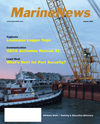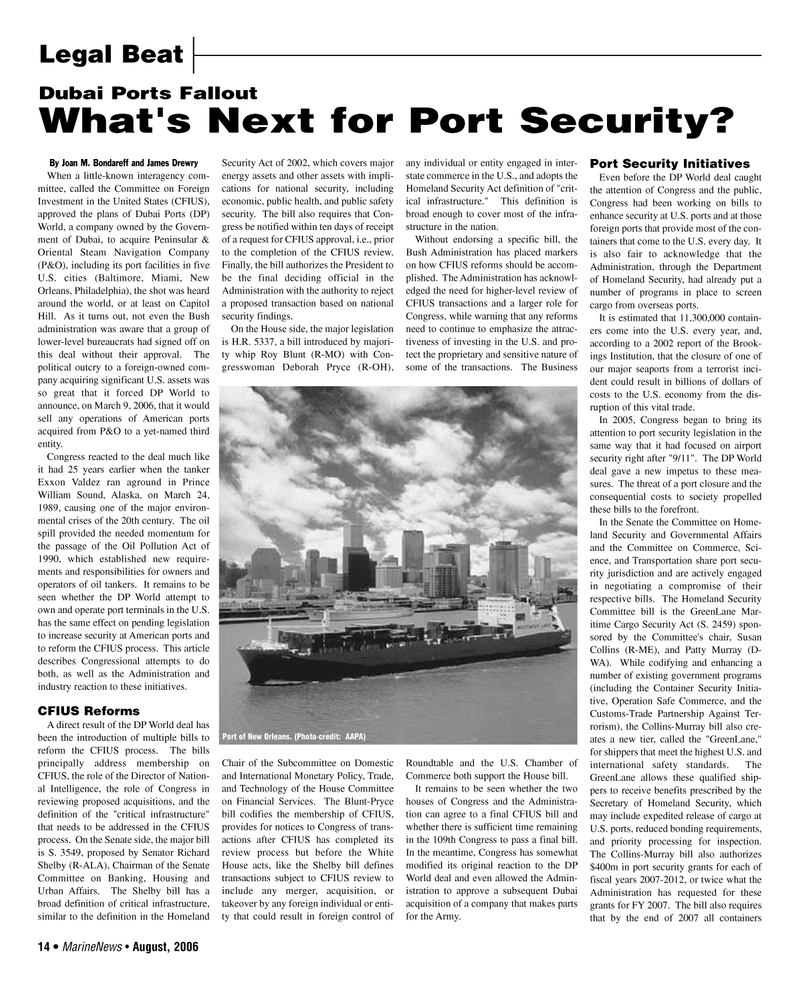
Page 14: of Marine News Magazine (August 2006)
AWO Edition: Inland & Offshore Waterways
Read this page in Pdf, Flash or Html5 edition of August 2006 Marine News Magazine
By Joan M. Bondareff and James Drewry
When a little-known interagency com- mittee, called the Committee on Foreign
Investment in the United States (CFIUS), approved the plans of Dubai Ports (DP)
World, a company owned by the Govern- ment of Dubai, to acquire Peninsular &
Oriental Steam Navigation Company (P&O), including its port facilities in five
U.S. cities (Baltimore, Miami, New
Orleans, Philadelphia), the shot was heard around the world, or at least on Capitol
Hill. As it turns out, not even the Bush administration was aware that a group of lower-level bureaucrats had signed off on this deal without their approval. The political outcry to a foreign-owned com- pany acquiring significant U.S. assets was so great that it forced DP World to announce, on March 9, 2006, that it would sell any operations of American ports acquired from P&O to a yet-named third entity.
Congress reacted to the deal much like it had 25 years earlier when the tanker
Exxon Valdez ran aground in Prince
William Sound, Alaska, on March 24, 1989, causing one of the major environ- mental crises of the 20th century. The oil spill provided the needed momentum for the passage of the Oil Pollution Act of 1990, which established new require- ments and responsibilities for owners and operators of oil tankers. It remains to be seen whether the DP World attempt to own and operate port terminals in the U.S. has the same effect on pending legislation to increase security at American ports and to reform the CFIUS process. This article describes Congressional attempts to do both, as well as the Administration and industry reaction to these initiatives.
CFIUS Reforms
A direct result of the DP World deal has been the introduction of multiple bills to reform the CFIUS process. The bills principally address membership on
CFIUS, the role of the Director of Nation- al Intelligence, the role of Congress in reviewing proposed acquisitions, and the definition of the "critical infrastructure" that needs to be addressed in the CFIUS process. On the Senate side, the major bill is S. 3549, proposed by Senator Richard
Shelby (R-ALA), Chairman of the Senate
Committee on Banking, Housing and
Urban Affairs. The Shelby bill has a broad definition of critical infrastructure, similar to the definition in the Homeland
Security Act of 2002, which covers major energy assets and other assets with impli- cations for national security, including economic, public health, and public safety security. The bill also requires that Con- gress be notified within ten days of receipt of a request for CFIUS approval, i.e., prior to the completion of the CFIUS review.
Finally, the bill authorizes the President to be the final deciding official in the
Administration with the authority to reject a proposed transaction based on national security findings.
On the House side, the major legislation is H.R. 5337, a bill introduced by majori- ty whip Roy Blunt (R-MO) with Con- gresswoman Deborah Pryce (R-OH),
Chair of the Subcommittee on Domestic and International Monetary Policy, Trade, and Technology of the House Committee on Financial Services. The Blunt-Pryce bill codifies the membership of CFIUS, provides for notices to Congress of trans- actions after CFIUS has completed its review process but before the White
House acts, like the Shelby bill defines transactions subject to CFIUS review to include any merger, acquisition, or takeover by any foreign individual or enti- ty that could result in foreign control of any individual or entity engaged in inter- state commerce in the U.S., and adopts the
Homeland Security Act definition of "crit- ical infrastructure." This definition is broad enough to cover most of the infra- structure in the nation.
Without endorsing a specific bill, the
Bush Administration has placed markers on how CFIUS reforms should be accom- plished. The Administration has acknowl- edged the need for higher-level review of
CFIUS transactions and a larger role for
Congress, while warning that any reforms need to continue to emphasize the attrac- tiveness of investing in the U.S. and pro- tect the proprietary and sensitive nature of some of the transactions. The Business
Roundtable and the U.S. Chamber of
Commerce both support the House bill.
It remains to be seen whether the two houses of Congress and the Administra- tion can agree to a final CFIUS bill and whether there is sufficient time remaining in the 109th Congress to pass a final bill.
In the meantime, Congress has somewhat modified its original reaction to the DP
World deal and even allowed the Admin- istration to approve a subsequent Dubai acquisition of a company that makes parts for the Army.
Port Security Initiatives
Even before the DP World deal caught the attention of Congress and the public,
Congress had been working on bills to enhance security at U.S. ports and at those foreign ports that provide most of the con- tainers that come to the U.S. every day. It is also fair to acknowledge that the
Administration, through the Department of Homeland Security, had already put a number of programs in place to screen cargo from overseas ports.
It is estimated that 11,300,000 contain- ers come into the U.S. every year, and, according to a 2002 report of the Brook- ings Institution, that the closure of one of our major seaports from a terrorist inci- dent could result in billions of dollars of costs to the U.S. economy from the dis- ruption of this vital trade.
In 2005, Congress began to bring its attention to port security legislation in the same way that it had focused on airport security right after "9/11". The DP World deal gave a new impetus to these mea- sures. The threat of a port closure and the consequential costs to society propelled these bills to the forefront.
In the Senate the Committee on Home- land Security and Governmental Affairs and the Committee on Commerce, Sci- ence, and Transportation share port secu- rity jurisdiction and are actively engaged in negotiating a compromise of their respective bills. The Homeland Security
Committee bill is the GreenLane Mar- itime Cargo Security Act (S. 2459) spon- sored by the Committee's chair, Susan
Collins (R-ME), and Patty Murray (D-
WA). While codifying and enhancing a number of existing government programs (including the Container Security Initia- tive, Operation Safe Commerce, and the
Customs-Trade Partnership Against Ter- rorism), the Collins-Murray bill also cre- ates a new tier, called the "GreenLane," for shippers that meet the highest U.S. and international safety standards. The
GreenLane allows these qualified ship- pers to receive benefits prescribed by the
Secretary of Homeland Security, which may include expedited release of cargo at
U.S. ports, reduced bonding requirements, and priority processing for inspection.
The Collins-Murray bill also authorizes $400m in port security grants for each of fiscal years 2007-2012, or twice what the
Administration has requested for these grants for FY 2007. The bill also requires that by the end of 2007 all containers 14 • MarineNews • August, 2006
Legal Beat
Dubai Ports Fallout
What's Next for Port Security?
Port of New Orleans. (Photo credit: AAPA)
AUGUST MN2006 2(9-16).qxd 8/3/2006 3:22 PM Page 14

 13
13

 15
15
